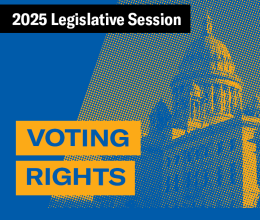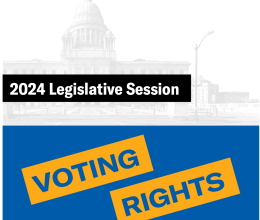In response to a lawsuit filed by the Rhode Island ACLU last month, U.S. District Judge William Smith has today struck down a Central Falls charter provision that kept Mayoral candidate Hipolito Fontes off the ballot. The judge agreed that the local Board of Canvassers acted unconstitutionally in disqualifying him from the ballot for allegedly failing to submit sufficient nomination signatures.
Fontes needed 200 valid signatures to qualify for the ballot, and he turned in 333 signatures. In contrast to state law, Central Falls allows voters to sign only one nomination paper per office, and in the case of multiple signatures, the Board of Canvassers accepts the one on the papers that were first filed with the Board. As a result, the Board of Canvassers disqualified more than 60 of Fontes’s signatures because they also appeared on current Mayor Charles Moreau’s signature petitions, and Moreau was deemed to have submitted his papers first – two minutes ahead of Fontes.
The lawsuit, filed by RI ACLU volunteer attorneys Armando Batastini and Timothy Baldwin from the law firm of Nixon Peabody, noted that candidates “have no way of knowing whether signatures on their nomination papers also appear on the nomination papers of other candidates for the same office,” and that there is no legitimate governmental interest in distinguishing between first-filed nomination papers and later-filed nomination papers. Judge Smith agreed, stating: “The additional and differing rules imposed by the City, which are at odds with those of the State of Rhode Island, serve to generate confusion, not eliminate it, and to foster chaos, not reduce it.”
The judge called the impact of the “first filed” rule a significant burden on candidates and voters in at least three ways: “A voter’s second signature … may secure that voter’s nomination endorsement to the exclusion of his or her first choice,” “a candidate who wishes to exclude potential rivals can effectively do so by collecting vastly more signatures than needed to get on the ballot,” and an “absurdity” results where “candidates must engage in a race to the Board of Canvassers office in hopes of reaching the time-machine stamp first. And, of course, if City Hall is controlled by an incumbent mayor who is running for re-election and may literally have the keys to City Hall, he could have a critical head start in the race …One does not have to be a complete cynic about small town politics to see the potential for manipulation.”
In conclusion, the judge barred the Board of Canvassers from invalidating signatures on Fontes’ nomination papers based solely on the fact that they appeared on another candidate’s papers that were filed prior to his. RI ACLU volunteer attorney Batastini said today: “I am gratified that the court gave a thorough review to the issues we raised and am pleased with the conclusions he reached after conducting that review.”



